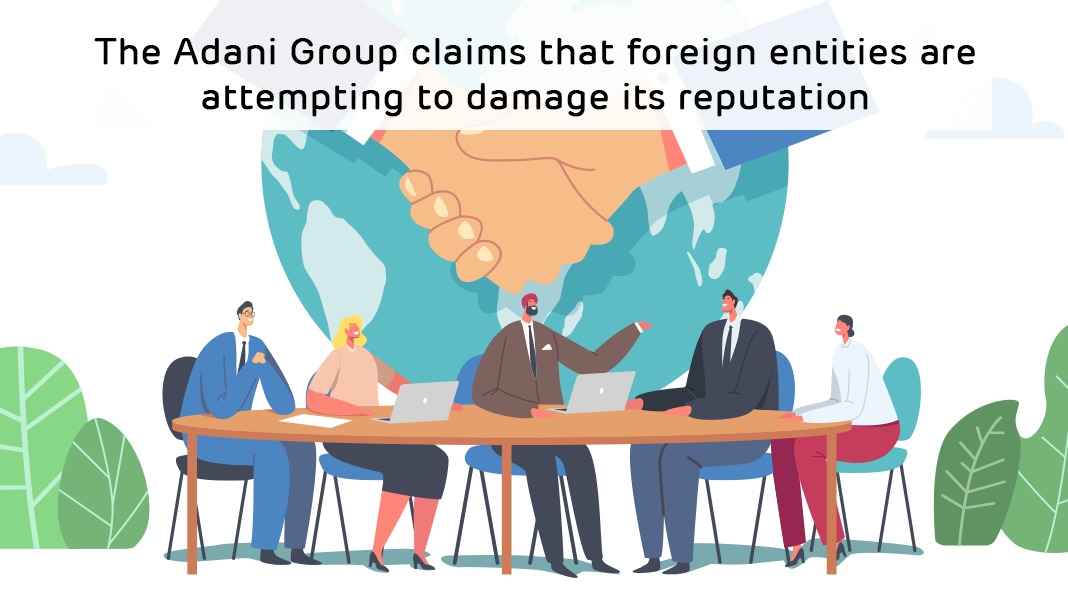
The Adani Group claims that foreign entities are attempting to damage its reputation
The Adani Group said that some international organizations are continuing their coordinated attacks by bringing up old, unfounded charges to lower its market value and damage the conglomerate’s reputation before the Supreme Court hearing. The SEBI probe on claims of financial fraud and stock manipulation against the Adani Group is scheduled for the Adani Supreme Court hearing. But the Adani group denied all the allegations mentioned under the “Hindenburg report Adani”.
An attempt to financially destabilize the Adani Group by bringing up old, false claims and over-invoicing of coal imports has already failed, according to a statement from the Adani Group. It stated that the publication’s planned report is based on the DRI’s General Alert Circular from March 30, 2016.
The Adani Group stated during the Adani Supreme Court hearing that the claims made in the “Hindenburg report Adani” are baseless allegations
The article singled out the Adani Group, while the DRI’s circular mentions as many as 40 importers, including the Adani Group companies. This list contains not just some of the top private power producers in India, such as Reliance Infra, JSW Steel, and Essar, but also state power producers from Karnataka, Gujarat, Haryana, Tamil Nadu, etc., as well as NTPC and MSTC.
The Directorate of Revenue Intelligence (DRI) circular claims that Adani Group companies overpriced imported machinery and equipment from a company headquartered in the United Arab Emirates (UAE). It harboured suspicions that part of the money spent in such transactions may have returned to the listed firms owned by the Adani Group.
Adani Group says that the Hindenburg report is deliberately recycling old allegations to support vested interests
The Financial Times and its allies are making new attempts to resurrect old and unfounded claims to damage the reputation and position of the Adani Group. This is a part of their ongoing effort to advance private interests in the name of the general good. To continue their unrelenting campaign, Dan McCrum of the Financial Times will lead the upcoming assault. On August 31, 2023, he and the OCCRP released a fake narrative about the Adani Group.
George Soros has openly expressed his animosity towards the Adani Group and funds the OCCRP. The Financial Times is reviving an old, false claim of over-invoicing coal imports to financially undermine the Adani Group before failing. The fact that the Financial Times singled out the Adani Group when the DRI’s Circular, the basis for the entire story, includes as many as 40 importers, including the Adani Group entities, exposes the publication’s arrogant purpose.
This list also covers the state power-producing firms of Karnataka, Gujarat, Haryana, Tamil Nadu, etc., the NTPC, and MSTC, in addition to some of India’s largest private power generators like Reliance Infra, JSW Steels, and Essar. Interestingly, the DRI’s Show Cause Notice accusing Knowledge Infrastructure of the 40 importers included in the General Alert Circular of overvaluing coal imports was overturned by the appellate tribunal (CESTAT).
The DRI’s appeal was dismissed as withdrawn by the Hon’ble Supreme Court of India on January 24, 2023, commenting that they appreciated the government’s stance in forgoing pointless litigation. India’s highest court of law has settled the overvaluation of coal imports. The proposed plot by The Financial Times is a deft recycling and selective misrepresentation of facts and information readily available to the public, combined with a purposeful and cunning concealment of judicial rulings to reach a preconceived result.
It must demonstrate more regard for India’s judicial and regulatory systems and agencies. Additionally, it wilfully ignores the reality that India purchases coal on a long-term supply basis through an open, transparent, international bidding procedure, removing any chance of price manipulation. The Central Electricity Regulatory Commission (CERC) fixes tariffs through an open, transparent, and independent process that thoroughly considers all factors and collaborates with the electricity producer, distributor, and retail customers.
The Adani Group denies all the allegations during the Adani Supreme Court hearing
During the Adani Supreme Court hearing, the Central Electricity Regulatory Commission (CERC) said that tariff fixation is an open, transparent, and independent process where the tariffs are fixed following meticulously evaluating all variables and in consultation with the power generator, distributor, and retail consumers. It added that the numerous stakeholders have several opportunities to look at all factors determining the tariffs, including the import value of coal.
It is not a coincidence that these stories often surface right before crucial court hearing dates in India. The Adani Group said that while it rejects all of these accusations as untrue and unfounded, it also strongly condemns any intentional and motivated attempts to undermine the Adani Group. It claims to be a law-abiding business that adheres to all laws, regulations, and disclosure obligations with the utmost respect for the rule of law.


